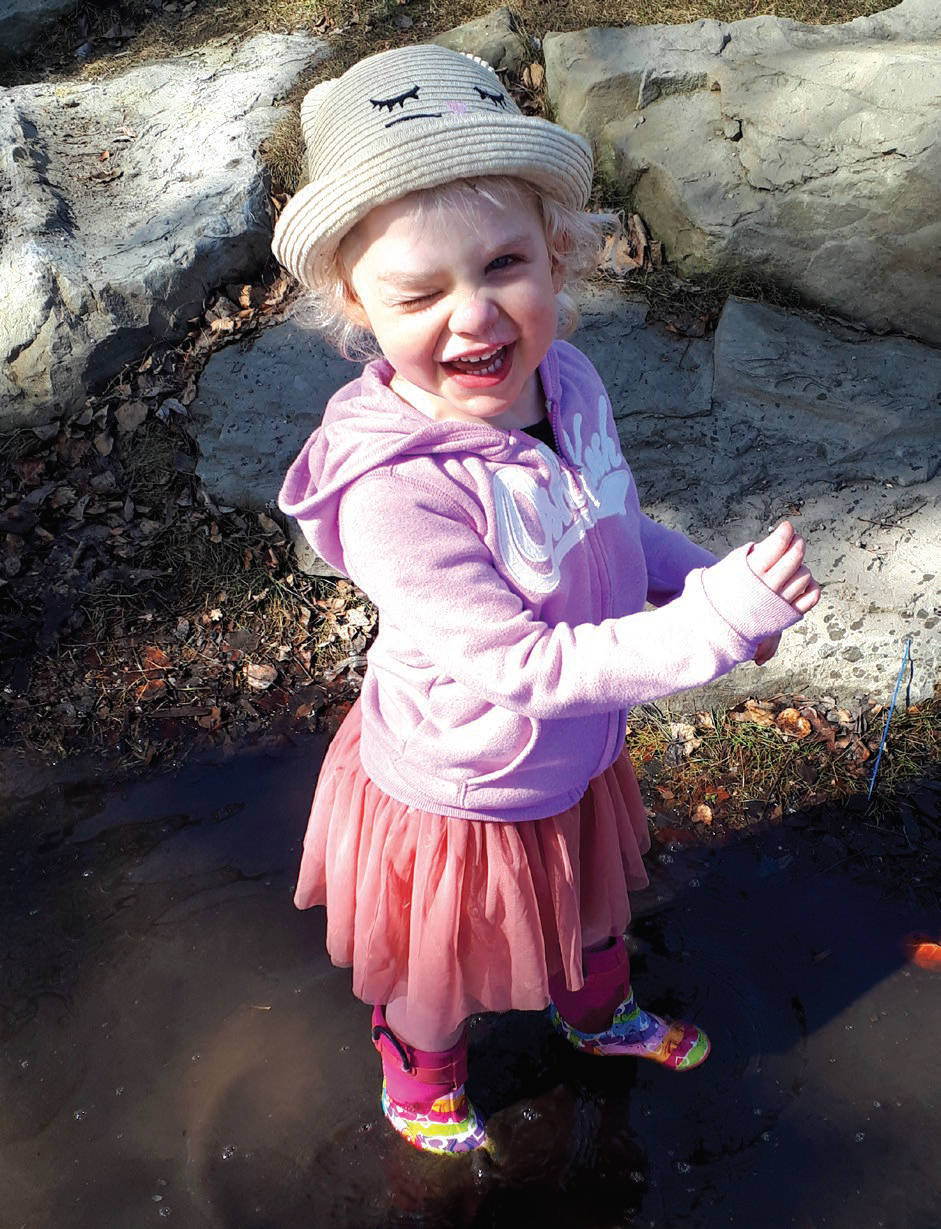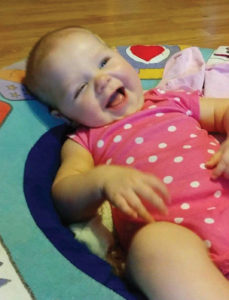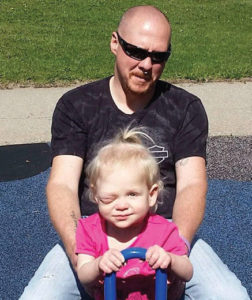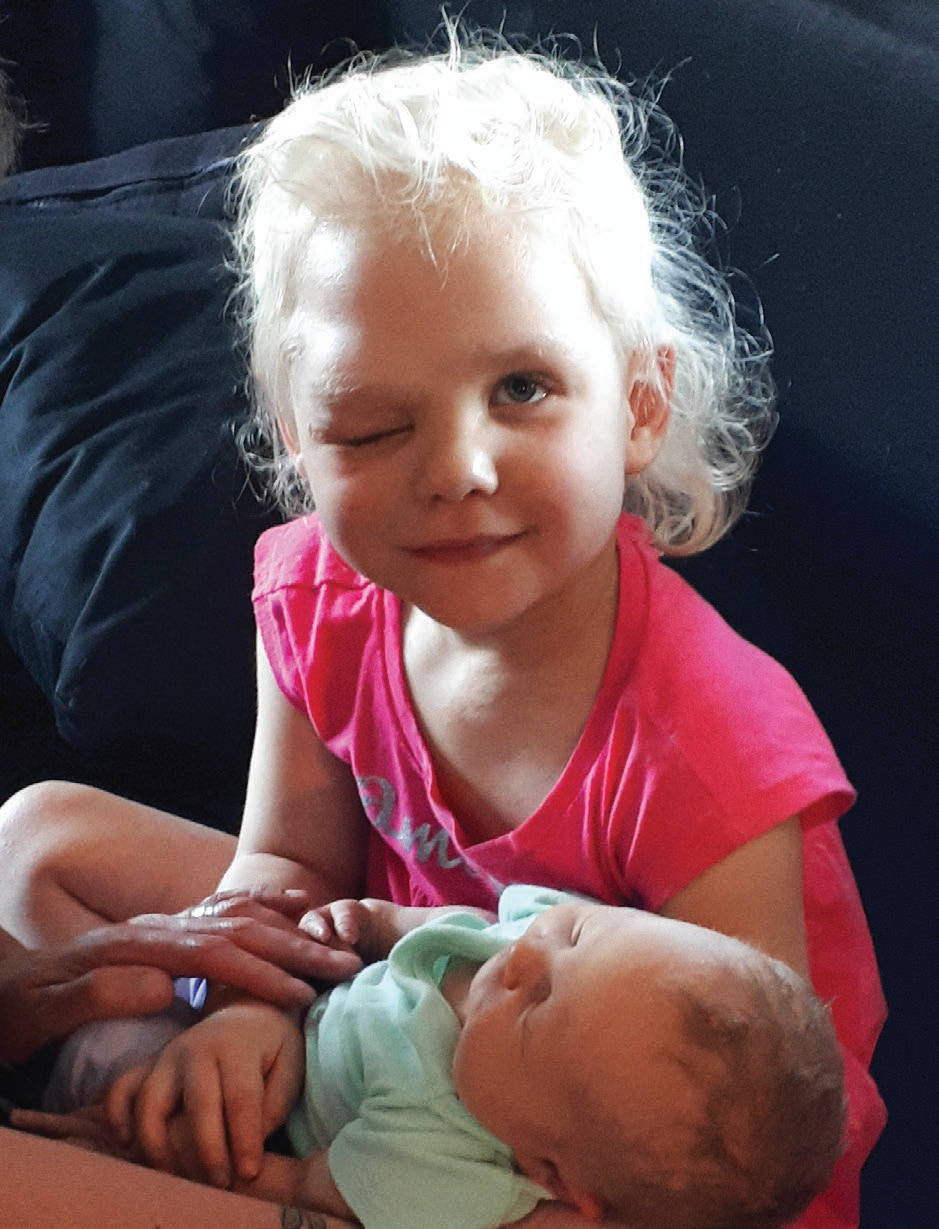
THE IMPORTANCE OF STORYTELLING AND LIFE WITH NF
AN INTERVIEW WITH STACEY KINLEY
IMPORTANCE OF STORY TELLING
I wanted to share my experience with NF because it’s so important to share your story, especially for people with NF. My daughter Mackenzie who has NF1 has a very visible tumour and I worry she will be teased at school. If you have a child with cystic fibrosis, people understand what that is and won’t be scared of it. But Mackenzie doesn’t look like everyone else, and we don’t want her to hide because of it. I don’t want her to grow up without confidence. She’s beautiful and kind and wants to be friends with everyone. We want to encourage her friends and people to ask questions about her. We want to show people that there’s more to Mackenzie then just her epilepsy and NF.
Stacey is a mom from Alberta who opened her heart to share the family’s journey with NF.
ON HER CONNECTION TO NF
We have two girls: Mackenzie and Hazelyn. Mackenzie turns four in one week and has NF1 from a spontaneous mutation. When Mackenzie was two days old, she began to have seizures while we were in hospital. As I’ve worked with adults with disabilities, I recognized the seizures when they first happened. But I didn’t want to be the stereotypical, panicked new mom and I just wanted to go home. So I didn’t say anything to the doctors; only my husband. The lactation nurse noticed the seizures. She was the one who encouraged me to say something. The paediatrician reassessed her a few weeks later and she told me, “Since Mackenzie is awake you can drive her. If she wasn’t awake, we’d get you an ambulance. But they’re waiting for you at the hospital.” I was trying so hard not to cry, looking at the ceiling, trying to compose myself. We drove to the hospital, and the rest seems like a blur. They did an MRI and saw that she has cortical dysplasia. They’ll never know if the epilepsy is a cause of NF or separate, but we treat them separately regardless. We were told that if she didn’t get control of the seizures by the time she was six months old, she would have infantile spasms. And those began before she was even two months old, which led to brain surgery before she was 13 weeks old, to resect the area of her brain that was having seizures. While the surgery did stop her spasms for just over a year, she began to have seizures caused by another part of her brain. She’s now been diagnosed with refractory epilepsy, as she hasn’t responded well to a variety of medications. Her seizures come and go now. We’re grateful for the times when there are no seizures, as this is when she can develop and grow. The seizures have become a part of life now.
ON FINDING TREATMENT
When Mackenzie was three months old, we noticed an abnormality beside her right eye. As it grew with her, her neurologists assured us it was nothing to worry about. But at nine months old, I noticed spots on her. This was when we first heard from our pediatrician that Mackenzie may have NF. We went to a geneticist and discovered six months later (which felt like forever) that she did have NF1. Since then, Mackenzie has had two debulking surgeries to try to resect the mass that surrounds her eye. While the eye surgeon was determined to fight and remove this tumour, other doctors discouraged the surgeries as it only “angered” the tumour.
I read about MEK inhibitors, but we were unable to get selumetinib in Canada. We tried trametinib last January at Toronto Sick Kids and we were there for nearly five weeks. It took nearly a year for me to convince Mackenzie’s doctors to help us get her into the trial. We were put in touch with a social worker who helped us find funding to relieve the financial burden of travelling across the country so frequently. We now go to Toronto every three months for follow-ups.
Mackenzie has one tumour around her artery, and another tumour on the left side that goes around her carotid artery, up to her jaw bone, around her ear, and into her arm, shoulder, near her spine, and the top arch of her aorta. She has another tumour at the base of her skull. We’ve seen a shadow on her heart during echocardiograms. But there’s nothing to be done to it, unless her lips go blue or we see any other major signs. The drug has made a very minimal decrease in actual tumour growth, so now we’re monitoring her and are going without the drug to let her enjoy her summer.
ON THE MEANING OF MILESTONES
I had to tell my husband one day that we have to grieve. He didn’t understand. Mackenzie was alive, what was there to grieve? But I told him that there are certain aspects of parenthood that we need to grieve, given Mackenzie’s diagnosis and ongoing struggles, and we need to find a way to do that together. We don’t know if she will be able to get married, finish school or, at that time, even walk. We came into parenthood thinking we knew what our milestones were going to be, but now we don’t. He finally realized what I was trying to say and said he didn’t want to think about that. But we have to so we are prepared for milestones that may not come. So now we celebrate everything! Everything comes at a different pace, but every milestone of Mackenzie’s comes with celebration, hoots and hollers (I’m sure our neighbours think we’re crazy). She didn’t walk until she was two years old, but she does now. She’s in the process of developing her speech with the help of a speech pathologist.
ON HAVING A SECOND CHILD AS PARENTS WITH NF
 Now that we have a second child, we’re constantly monitoring and analyzing our youngest for signs that something may be wrong, despite the doctors saying there’s only a 1% chance that she has NF. It really takes a conscious effort to not be anxious or overly critical all the time. We had an appointment with our youngest daughter’s pediatrician, and our doctor asked if we had any questions. I said, “What’s normal now?” She began to explain what seizures look like, but I understood that. When your child is having upwards of sixty seizures a day, it isn’t hard to identify them. I wanted to know what normal looks like now for us. And she had no answer for us at first. But she helped explain what movements indicate a trip to Children’s [Hospital] and what are just regular movements(because they can be hard to distinguish).
Now that we have a second child, we’re constantly monitoring and analyzing our youngest for signs that something may be wrong, despite the doctors saying there’s only a 1% chance that she has NF. It really takes a conscious effort to not be anxious or overly critical all the time. We had an appointment with our youngest daughter’s pediatrician, and our doctor asked if we had any questions. I said, “What’s normal now?” She began to explain what seizures look like, but I understood that. When your child is having upwards of sixty seizures a day, it isn’t hard to identify them. I wanted to know what normal looks like now for us. And she had no answer for us at first. But she helped explain what movements indicate a trip to Children’s [Hospital] and what are just regular movements(because they can be hard to distinguish).
 Hazelyn’s milestones now are surrounded with more happiness then McKenzie’s. When Hazelyn smiles, we’re so happy to see this milestone. But with MacKenie it was “there’s a smile but she should have smiled months ago” and it was filled with much more sadness. Now we’re just able to enjoy these moments.
Hazelyn’s milestones now are surrounded with more happiness then McKenzie’s. When Hazelyn smiles, we’re so happy to see this milestone. But with MacKenie it was “there’s a smile but she should have smiled months ago” and it was filled with much more sadness. Now we’re just able to enjoy these moments.
ON SELF-CARE
It’s hard to find time to myself. My husband and I went away before Hazelyn was born, and we try to make time for date nights. But I try to make time for other moms too. I try to be there for the moms whose children are recently diagnosed and are overwhelmed by the medical system. In fact, just being there for them is therapeutic for me. Being able to help someone find those necessary resources that I couldn’t is gratifying for me. Being able to talk to moms is gratifying because I didn’t do that. I stayed inside all day with the windows drawn after I first had Mackenzie. There was a permanent divot in my couch from just sitting and nursing her all day long. I stopped taking care of myself. I put on weight and now I’m not as active. The stress alone of having a child with NF is really tough on you emotionally and physically. I didn’t care about what I ate, and even going for a bike ride wasn’t fun when Mackenzie didn’t have enough muscle tone to be in the bike trailer without me feeling guilty.
ON IDENTITY AND NF
We didn’t want to tell people that Mackenzie had epilepsy for the longest time. We didn’t want that to be a part of who she was, or how she was identified. But we know now that NF is a part of who Mackenzie is, and in order for our family and friends to understand our struggles, they need to know the whole story. One time, I was talking to my co-worker about Mackenzie and unintentionally said that we have epilepsy, our family. But she understood. Because Mackenzie’s epilepsy affects more than just her – it’s a part of our family and who we are.
RESILIENCY
People ask how we do it, with all of Mackenzie’s struggles – but you just do it. That’s what parents do. Parents with NF understand that you have to take it one day at a time, one diagnosis at a time. Because if you do it any other way, you’re going to be drained emotionally and you aren’t going to able to care for yourself and your kiddos.

Interviewed by Desirée Sher
